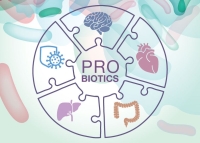04 / 22 / 2022
Although many chronic health conditions increase the severity of COVID-19, it has been observed that diabetes patients are at significantly higher risk of serious disease, complications, and death from COVID-19. Currently, 1 in 11 adults in the world has diabetes, and it is estimated that by 2050 almost 1 in 3 people will have diabetes or pre-diabetes. More than 34 million Americans have diabetes and 7.5 million have pre-diabetes.
02 / 25 / 2022
Humans have more microbes in and on their body than the number of cells. Trillions of bacteria, viruses, and fungi live in the human digestive system and most of them are beneficial bacteria. Collectively they are called “gut microbiome” or “gut flora” and they are essential for a number of physiological functions to keep us healthy. The gut microbiome is now considered as one of the organs in the human body, and hence should be taken care of just like all other organs. Probiotics are the supplemental form of healthy bacterial colonies used to replenish the gut microbes. It is important to have a balanced bacterial population in the digestive system. Any imbalance in the digestive microbial environment is called dysbiosis.
01 / 13 / 2022
Marine plants, either marine algae or seaweeds, were part of the daily diet of our ancestors and have been consumed in different parts of Asia for centuries. Although plants like kelp, nori, dulce, and spirulina are more commonly used in sushi, Asian soups, snacks, or seasonings, there are many other varieties of sea plants packed with important nutrients. These sea vegetables absorb beneficial nutrients from the ocean and are very good sources of protein, fiber, healthy polyunsaturated fats, antioxidants, and vitamins and minerals. For example, after iodized salt they are the second richest source of iodine, and it is well known that iodine is critical for a healthy thyroid gland. Thyroid hormones - thyroxine (T4) and tri-iodothyronine (T3) - play a vital role in growth and development of the body and in regulating various metabolic processes, including basic metabolic rate, healthy functioning of the brain, heart, immune and digestive systems, and building strong muscles and bones. Two sea plants which contain critical nutrients for overall health are Irish moss and bladderwrack.
12 / 16 / 2021
In addition to the continuing COVID-19 pandemic and the omicron wave, the flu season is also upon us. As we have already learned, the RNA/DNA vaccines have severe limitations in preventing coronavirus infections, emerging viral mutants and their spread, and seasonal anti-flu vaccines cannot keep up with the viral mutations. It is difficult to protect ourselves from every single infectious agent unless our own immunity is strong. Most of the antivirals weaken the immune system and cause other side effects. It is critical to address the fundamental mechanisms of infection and increase the immunity of the human population.
11 / 05 / 2021
Diabetes is the one of the fastest growing non-communicable diseases worldwide. It is associated with high blood sugar levels, which increases the risk of cardiovascular disease and kidney problems. It increases one’s risk of serious COVID-19 outcomes, as 40% of people who have died of COVID-19 also had diabetes. Currently, 1 in 11 adults in the world has diabetes, and it is estimated that by 2050 almost 1 in 3 people will have diabetes or pre-diabetes. More than 34 million Americans have diabetes and 7.5 million have pre-diabetes. With such staggering statistics, the National Institutes of Health (NIH) has declared November as Diabetes Awareness Month to prevent and effectively manage this disease.
10 / 01 / 2021
Despite availability of vaccines, more than 2000 people die every day in the US alone due to COVID-19 and approximately 133,000 new cases are reported daily.1 Currently, more than 182 million Americans, or 54%, are considered fully vaccinated against SARS-CoV-2, and approximately 64% of the population has received at least one vaccine dose. However, reports indicate that vaccine efficacy reduces with time and booster doses are now recommended despite a lack of unity from the FDA and CDC experts in accepting this step. Moreover, new variants of the coronavirus further complicate the picture, and “breakthrough infections” in the fully vaccinated are on the rise. This situation calls for the revision of current approaches and incorporation of innovative health strategies that are effective, economic, and accepted by the majority of people worldwide.
09 / 01 / 2021
Vitamin C plays a critical role in human health, and we must take it in our diet or supplements since our bodies cannot produce it. Among the most important functions of vitamin C is protection of integrity and elasticity of blood vessels, and preventing formation of atherosclerotic plaques which are the underlying cause of heart attacks and strokes. The cardiovascular diseases result in millions of deaths each year. Low fat diets and cholesterol-reducing medicines have not been successful in addressing this issue.
08 / 04 / 2021
In the previous Health Science News Page, we discussed the benefits of vitamins D and K when applied individually. While these two fat-soluble vitamins have several health benefits, they work the best when combined. Vitamin D by itself is important for maintaining strong bones, a healthy cardiovascular and immune system, and has anti-cancer properties. The two different types of vitamin D are D2 (ergocalciferol) present in plant-based products such as mushrooms, and D3 (cholecalciferol) present in animal products and fatty fish. It is well known that vitamin D is needed for effective absorption of calcium from the digestive system and promoting its mobilization towards the bones. It also helps in regulating the calcium-phosphorus ratio required for healthy bones. Vitamin D3 works together with vitamin K2 in maintaining calcium balance in the body affecting activation of bone protein (osteocalcin) responsible for the incorporation of calcium in the bones. In clinical trials a combination of vitamin D3 and vitamin K2, especially subtype MK-7, increased bone density in postmenopausal women with osteoporosis compared to each vitamin taken individually and a placebo.
07 / 17 / 2021
Vitamin K is a fat-soluble vitamin now known for a variety of functions, however it is still referred to as the “blood clotting vitamin.” Currently, researchers are learning about its role in a wide array of physiological processes including during the COVID-19 pandemic. Vitamin K is essential for healthy bones, the cardiovascular system, the liver, kidneys, pancreas, brain and nervous system, and it has anti-inflammatory and anti-carcinogenic properties.
06 / 18 / 2021
Vitamin D is a fat-soluble vitamin, sometimes known as the sunshine vitamin because the ultraviolet rays from the sun initiate its production in the skin. Vitamin D is a type of prohormone that is produced when cholesterol in the skin is exposed to the UV rays from the sun. Further processing in the liver and kidneys is an important step in the production of the active form of vitamin D called calcitriol. The two different types of vitamin D are D2 (ergocalciferol) present in plant-based products such as mushrooms, and D3 (cholecalciferol) present in animal products and fatty fish. Vitamin D3 is found to be twice as effective as D2 in raising the blood levels of vitamin D.
05 / 29 / 2021
In the last issue of the Health Science News Page, we discussed insect-borne diseases with a specific focus on Lyme disease. Lyme disease was first widely recognized in 1975 in Old Lyme, Connecticut, USA. It is a bacterial infection caused by a type of bacteria called Borrelia. It is transmitted to humans through the bite of a tick that feeds on other small animals, pets, deer, mice, birds, and squirrels carrying the bacteria. Lyme disease starts with vague flu-like symptoms such as skin rashes, fever, muscle aches, and fatigue. Due to a lack of specific and reliable laboratory tests, the treatment is often delayed and the disease goes on untreated for a long time. In more advanced or chronic Lyme disease stages, people develop chronic arthritis, inflammation of the heart and other organs, neuropathies, sleep disturbances, cognitive impairment and other neurological symptoms including changes in some of the markers of autoimmune diseases. Oral and intravenous antibiotics are usually applied but their efficacy decreases when given in the later stage of infection. Moreover, many of the antibiotics are not effective due to wide-spread bacterial resistance.
05 / 14 / 2021
As summer approaches and people start outdoor activities, the season also brings an increased exposure to insects and insect-borne diseases. According to the Centers for Disease Control and Prevention, insect-borne diseases in the US increased more than three times in the last decade. Ticks, mosquitoes, and fleas are the most common carriers of these diseases and they especially increase during longer and hotter summer days. Lyme disease is one of the most common tick-borne diseases accounting for 3 in 5 cases of insect-borne diseases. It is found in more than 80 countries. In the US it is mainly found in the northeast, midwest and along the Pacific coast. Approximately 476,000 new cases of Lyme disease are diagnosed in the US every year, and close to two million people could be suffering from chronic Lyme disease.
04 / 23 / 2021
COVID-19 is not the only pandemic threatening the world right now. Metabolic syndrome (a combination of obesity, high blood pressure, and high blood sugar) which has been rising for decades before COVID-19 deteriorates overall health making people prone to other acute and chronic diseases. According to the CDC, close to 50% of the adult population in the US already has high blood pressure and only 1 in 4 of them have it under control. Appropriately named as the “silent killer,” consistent high blood pressure damages multiple organ systems in the body. In addition to the increased risk of a fatal heart attack and stroke, hypertension is a cause of other debilitating conditions such as heart failure, kidney damage, and various eye problems including blindness. While there are a large number of antihypertensive medications, some of the most common ones are thiazide diuretics, calcium channel blockers, beta-blockers, and ACE inhibitors. Most of these drugs are useful only for the temporary reduction of hypertension and are associated with a wide array of side effects. A very recent clinical trial conducted on more than 300,000 adults revealed that prolonged use of thiazides, including hydrochlorothiazide, was associated with a significantly increased risk of skin…
04 / 02 / 2021
The skin is not only the largest organ in the body with approximately 20 square feet of surface area, but also a mirror of our health. Our skin is the first barrier protecting us from pathogens and pollutants. It has a critical role in regulation of body temperature and elimination of many metabolic waste products. The appearance of our skin can tell us about excessive exposure to sunlight or environmental pollutants. It reflects whether we have had too much stress, a lack of sleep, are dehydrated or have consumed too much caffeine, sugar, alcohol, or cigarette smoke. The skin can indicate problems with the digestive, cardiovascular, and nervous systems functions, as well as hormonal imbalances and inflammatory conditions. Most of us are concerned with skin appearance for cosmetic reasons but some skin problems including oily or dry skin, acne, wrinkles, or age spots are indicative of poor health of the skin and internal organs. Good health starts with knowledge and if we want to take good care of our skin it is important to know more about this organ. The skin is composed of three main layers. The epidermis, the outermost layer, contains keratin and melanin to strengthen and protect…
03 / 20 / 2021
While there is a consensus that omega-3 and omega-6 fatty acids are “essential” for healthy body functions, there is a lot of confusing information surrounding their consumption from fish, fish oil supplements, and plant sources. Most people are concerned about the risk of environmental pollutants and heavy metals present in fish. However, they quite often miss the fact that the types of omega-3 fatty acids in fish versus the plant sources are not the same.
02 / 26 / 2021
As COVID-19 continues people turn to using various dietary supplements to support their immune system. Omega-3 is one such candidate that has multifaceted health benefits. Well known for its benefits in memory boosting and learning, omega-3 fatty acids are important in optimum function of the nervous, cardiovascular, immune, and respiratory systems. Omega-3 and omega-6 fatty acids are polyunsaturated fatty acids and are considered “essential fatty acids” because humans cannot produce them in the body. They are needed for optimum absorption of fat-soluble vitamins A, D, E, and K and help to maintain the structure and integrity of cellular membranes.



















